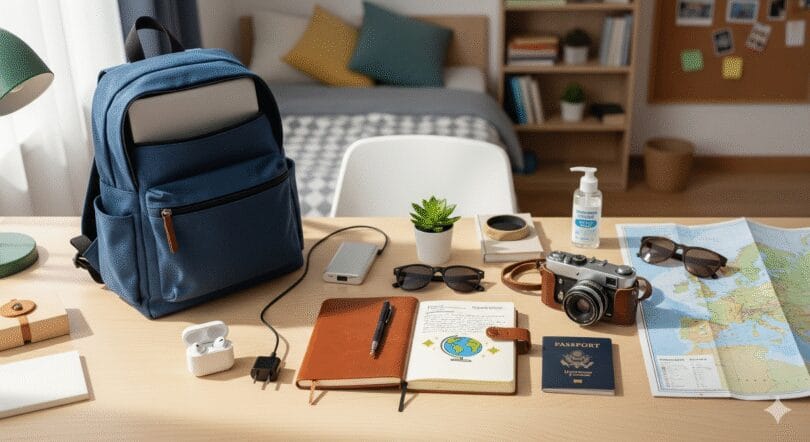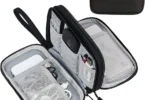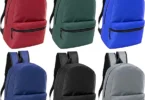Packing List for Studying Abroad
Studying abroad is one of the most exciting and transformative experiences a student can have. But before you embark on this journey, preparation is key. A packing list for studying abroad helps you organize all the essentials, ensuring comfort, convenience, and productivity during your time in a foreign country. Whether you’re moving to Europe, North America, or Asia, having a detailed checklist saves time, avoids last-minute stress, and prevents unnecessary purchases abroad.
Clothing Essentials
When it comes to packing for international studies, clothing is the foundation of your checklist. You need versatile, weather-appropriate, and comfortable outfits for everyday life, university, and social events.
-
Socks: At least 15 pairs to cover daily wear.
-
Shoes: Comfortable and durable; leather optional. Include one pair of formal shoes for interviews and events.
-
T-shirts: Half-sleeve and full-sleeve options for different weather conditions.
-
Underwear & vests: Daily essentials for hygiene and comfort.
-
2–3 Quarter pants: Casual wear suitable for campus life.
-
Warm clothes & jackets: Essential if you’re traveling to colder climates or during winter months.
-
Formal wear: Shirt, pants, tie, and formal shoes for presentations, interviews, or professional meetings.
Tip: Layering is essential to adapt to sudden weather changes abroad.
Kitchen and Food Accessories
Even if you stay in dorms, having basic cooking and dining items makes life easier. Your packing list for studying abroad should include:
-
Plates, pans, and spoons: For cooking small meals in hostels or apartments.
-
Spices: Turmeric, chili powder, and other essential seasonings.
-
Coffee & tea bags: For quick morning energy or study sessions.
-
Snacks: Noodles, biscuits, and Chanachur for easy meals.
-
Melamine water glass: Lightweight, durable, and convenient.
Tip: Check local markets for availability of spices or utensils before packing bulky items.
Tech and Study Essentials
Staying connected and productive is critical while studying abroad. Include these in your packing list for studying abroad:
-
Power bank & earbuds: Keep your devices charged and enjoy online classes.
-
Phone cover: Extra silicone cover to protect against accidental drops.
-
College bag: Waterproof, durable, and comfortable for daily use.
-
Timer, pens, notebooks & diary: For effective time management and note-taking.
-
2-pin socket adapter (European pin): Mandatory for European countries.
Tip: Organize all cables and chargers in a dedicated pouch to avoid damage.
Personal Care and Cosmetics
Maintaining hygiene and personal care is essential for students living abroad. Add the following to your checklist:
-
Toiletries: Shampoo, face wash, lotion, creams, lip gel.
-
Travel-size towels: Compact and quick-dry for dorm use.
-
Perfume: Optional, for social and formal occasions.
-
Razors & blades: Include essentials for grooming.
Tip: Travel-size products reduce luggage space and comply with airline regulations.
Health and Medical Essentials
Being prepared for minor illnesses or emergencies is crucial. Include these in your packing list for studying abroad:
-
Medicines: Naproxen, gastric relief tablets, saline, and any personal prescriptions.
-
First aid kit: Compact with plasters, antiseptic cream, and essential medications.
Tip: Keep copies of prescriptions for medications that require documentation abroad.
Daily Life Accessories
Other practical items for everyday life abroad:
-
Sunglasses: Protect your eyes from harmful UV rays.
-
Money bag: Secure storage for cash, cards, and important documents.
-
Room slippers/shoes: For indoor comfort at dorms or apartments.
Tip: Label all personal items to avoid misplacement.
Packing Tips for Smart Students
-
Start early: Pack 2–3 weeks before departure to avoid stress.
-
Use packing cubes: Organize clothes, tech, and toiletries efficiently.
-
Check airline luggage restrictions: Avoid overweight luggage fees.
-
Buy bulky items locally: Towels, bedding, or kitchen items can be purchased abroad.
-
Prioritize essentials: Focus on items used daily rather than luxury or bulky items.
FAQs
1. How many clothes should I pack?
At least 15 pairs of socks, several shirts and pants, and seasonal jackets.
2. Which tech gadgets are essential?
Laptop, power bank, earbuds, phone cover, and a universal adapter.
3. Can I bring snacks and spices?
Yes, small quantities are allowed. Always check customs regulations for the country.
4. How can I save luggage space?
Use packing cubes, buy bulky items locally, and limit clothing to essentials.
Conclusion
A packing list for studying abroad is your key to a stress-free and organized international experience. By preparing clothing, tech, personal care, health, kitchen, and daily-life accessories, students can focus on academic success and personal growth.
Plan ahead, pack smartly, and enjoy your adventure abroad!
Read also:














